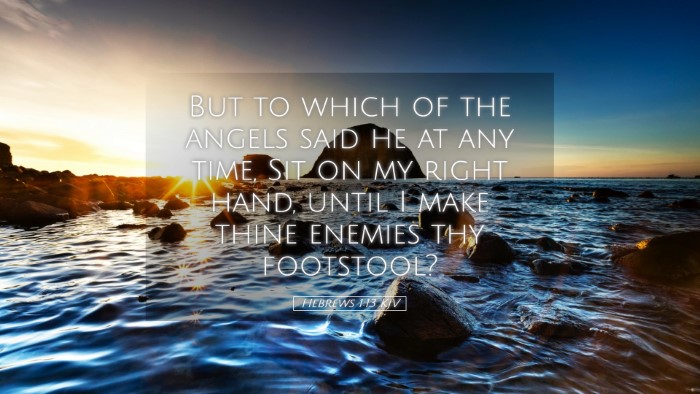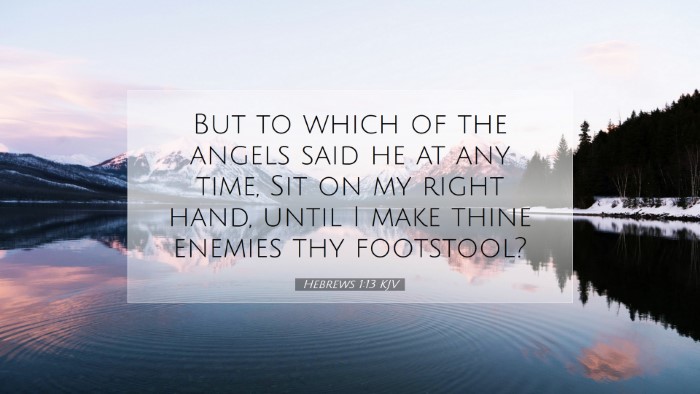Old Testament
Genesis Exodus Leviticus Numbers Deuteronomy Joshua Judges Ruth 1 Samuel 2 Samuel 1 Kings 2 Kings 1 Chronicles 2 Chronicles Ezra Nehemiah Esther Job Psalms Proverbs Ecclesiastes Song of Solomon Isaiah Jeremiah Lamentations Ezekiel Daniel Hosea Joel Amos Obadiah Jonah Micah Nahum Habakkuk Zephaniah Haggai Zechariah MalachiHebrews 1:13
Hebrews 1:13 KJV
But to which of the angels said he at any time, Sit on my right hand, until I make thine enemies thy footstool?
Hebrews 1:13 Bible Commentary
Commentary on Hebrews 1:13
Hebrews 1:13 states, "But to which of the angels said he at any time, Sit on my right hand, until I make thine enemies thy footstool?" This verse is pivotal as it underscores the superiority of Christ over the angels, establishing the unique authority bestowed upon Him by God.
Contextual Understanding
The author of Hebrews addresses a community that appears to be struggling with their faith amid persecution and societal pressure. The opening chapter aims to affirm the divinity and supremacy of Christ over all creation, particularly in relation to angelic beings, who were revered within Jewish tradition.
Insights from Matthew Henry
Matthew Henry, in his commentary, emphasizes the Lord’s declaration, pointing out that no angel was ever given such an intimate and exalted position as Christ. He remarks, "The dignity of the Son of God is set forth here in his sovereign authority; he is called to sit at the right hand of the Majesty on high." This illustrates the unique role of Jesus as both God and King.
- The right hand of God: This position symbolizes ultimate authority and power.
- Enemies as a footstool: This metaphor reflects the complete victory Christ has over His adversaries.
Henry further notes that this passage shows God's intention to subordinate all creation under Christ, affirming that the angels serve Him and are not equal to Him.
Insights from Albert Barnes
Albert Barnes provides a detailed examination of the verse, asserting that the statement of sitting at God's right hand is indicative of Christ's divine majesty and rule. He states, "This sentence is expressive of the highest honor and authority." Barnes notes that the contrast drawn here serves to elevate Christ beyond the angels.
- Divine Authority: The act of sitting signifies a completed work and divine ruling authority.
- Not spoken to angels: Barnes highlights that God has never addressed an angel in this manner, thus confirming Christ’s unique status.
He also emphasizes the eschatological implications of this verse, where the enemies of Christ will ultimately be subdued, showcasing a future hope for believers.
Insights from Adam Clarke
Adam Clarke’s commentary offers reflections on the significance of the phrase "Sit on my right hand." He argues that this position denotes both power and honor, underscoring Jesus’ role as the Mediator between God and humanity. Clarke comments, "This is an exaltation to which no creature is ever admitted."
- Historical context: Clarke explores the cultural significance of the right hand in biblical times as a place of favor and authority.
- Comparison with Psalms: Clarke references Psalm 110:1, relating this prophetic declaration to its fulfillment in Christ.
Clarke highlights that the phrase signifies not only the authority of Christ but also His intercessory role, assuring believers of their security and the impending triumph over evil.
Theological Implications
This verse challenges believers to consider the authority of Christ in their lives and emphasizes the need for acknowledgment of His sovereign rule. Jesus' exaltation is a central tenet of Christian faith, depicting Him as the ultimate victor.
- Celebration of Christ's Kingship: The verse calls for recognition and worship, highlighting the importance of Christ’s reign in the believer's life.
- Hope and Assurance: Believers are assured that Christ's victory over His enemies ensures their eventual triumph over sin and death.
This understanding instills hope and encourages believers to pursue a deeper relationship with Christ, recognizing Him as their Lord and King.
Conclusion
Hebrews 1:13 is a profound declaration of the relationship between Christ and the angels, making clear His divine authority and unique status. As detailed by scholars like Matthew Henry, Albert Barnes, and Adam Clarke, this verse serves as an encouragement to believers, inviting them to recognize the supremacy of Christ in all aspects of life. The enduring message is one of hope, invoking worship and a sense of security in Christ's ultimate victory over all forces contrary to God’s will.


